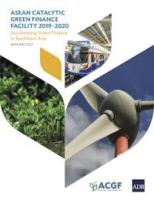
The PENCAS Act is a landmark legislation that institutionalizes the systematic measurement of stock and flows of natural resources and the contributions they provide to society and economy. Photo credit: ADB.
Putting nature on the Philippine balance sheet paves the way for holistic, evidence-based policymaking and programming.
The Philippine Ecosystem and Natural Capital Accounting System (PENCAS) Act, signed into law on 22 May 2024, marks a transformative step in integrating the value of natural resources into economic decision-making. It positions the Philippines as one of the global leaders in natural capital accounting (NCA), aligning its valuation and reporting with the United Nations System of Environmental-Economic Accounting (SEEA).
Why the PENCAS Act Matters
The Philippines is home to over 52,100 known species, more than half of which are found nowhere else in the world. Situated at the heart of the Coral Triangle, this archipelagic nation of over 7,000 islands derives substantial benefits from its rich natural resources, particularly its diverse coastal ecosystems. However, the value of these natural assets has historically been overlooked, leading to unsustainable exploitation and significant biodiversity loss.
The PENCAS Act institutionalizes NCA as a vital tool for recognizing and managing the interactions between the environment and the economy. By systematically measuring natural capital, it enables the government to incorporate the value of ecosystem services, such as water regulation and carbon sequestration, into national and local accounts. Moreover, information from NCA provides a critical lens to address the intertwined challenges of climate change and biodiversity loss, ensuring that proposed climate solutions are mindful of their impacts on nature and foster a holistic approach to policymaking. The integrated environmental and economic datasets enable the Philippines to make evidence-based decisions, ensuring development balances economic growth with ecological sustainability.
Quantifying natural assets has immediate practical benefits. For example, calculating the carbon sequestration potential of forests and coastal ecosystems creates opportunities to tap into global carbon markets. It also substantiates the Philippines' financing needs under the Paris Agreement, particularly for loss and damage caused by climate change. Additionally, the act strengthens the ability to measure and mitigate the environmental impacts of investments, unlocking funding streams for sustainable projects.

Key Components of the PENCAS Act
The PENCAS Act embeds environmental considerations into economic planning through the following provisions:
- Centralized data integration. The act mandates the Philippine Statistics Authority (PSA) to lead the development of a comprehensive information system and accounting framework. This system consolidates environmental and economic data, ensuring consistency, reliability, and accessibility across government agencies.
- Interagency coordination. The PSA Board oversees the implementation of a NCA roadmap, supported by interagency committees tasked with addressing sectoral and regional concerns. This ensures cohesive action across sectors.
- Capacity building for local governments. Recognizing the critical role of local governments, the act emphasizes capacity building for local government units to integrate NCA into local development planning. This ensures that natural capital considerations are effectively mainstreamed across governance levels.
- Transparency and public access. The act ensures public access to natural capital accounts, promoting transparency and enabling stakeholders, including civil society, academia, and the private sector, to use the data for advocacy and decision-making.
- Recognition of ecosystem services. By quantifying ecosystem services such as water, minerals, forests, and marine biodiversity, the act supports evidence-based policies and programs to protect and sustainably manage these critical resources.
- Alignment with global standards. Through its adoption of the SEEA framework, the PENCAS Act ensures alignment with international best practices, promoting the compilation of consistent, reliable, and comparable NCA data.
Challenges to Implementation
The effective implementation of the PENCAS Act faces key challenges, including limited technical capacity in government agencies, requiring robust training programs; the need for standardized guidelines to ensure consistent and reliable data sharing; and resource constraints, such as insufficient personnel, tools, and funding. Fragmented efforts among stakeholders hinder cohesive action, while data gaps, particularly in areas like the blue economy, are compounded by issues with data sharing across government agencies. Furthermore, aligning NCA with existing policy frameworks and subnational applications adds another layer of complexity. Addressing these barriers is essential to fully realize the act’s potential.
The Philippines has a long history of pioneering NCA, dating back to the 1990s. Initiatives like the Philippine Economic-Environmental and Natural Resources Accounting project and the World Bank's Wealth Accounting and the Valuation of Ecosystem Services (WAVES) program laid the groundwork for the PENCAS Act. Today, the PSA publishes annual accounts for energy, minerals, and water resources, complemented by the biennial Compendium of Philippine Environment Statistics. The PENCAS Act builds on these achievements, mandating the expansion of NCA datasets to include other critical natural resources and ecosystem services.
The law also requires the creation of implementing rules and regulations to operationalize its provisions, ensuring that government agencies and local governments have clear guidelines for aligning their policies and programs with NCA outputs.
A Transformative Step
The PENCAS Act is more than a policy milestone—it represents a bold commitment to valuing and safeguarding the Philippines' natural wealth. By institutionalizing NCA, the law equips the country with the tools to balance economic progress with environmental preservation .
This legislation ensures that the value of ecosystems is recognized and integrated into decision-making, aligning with international sustainability goals while addressing local challenges.
The PENCAS Act underscores the principle that we must measure what we treasure, paving the way for a future where economic growth and ecological resilience go hand in hand.
To advance the implementation of the PENCAS Act, the Asian Development Bank, with support from the ASEAN Catalytic Green Finance Facility and the e-Asia Knowledge and Partnership Fund, organized a workshop in August on natural capital accounting for key stakeholders from the Department of Environment and Natural Resources, National Economic and Development Authority, Philippine Statistics Authority, Department of Science and Technology, Department of Agriculture, the Palawan Council for Sustainable Development, and the Philippine Space Agency.


